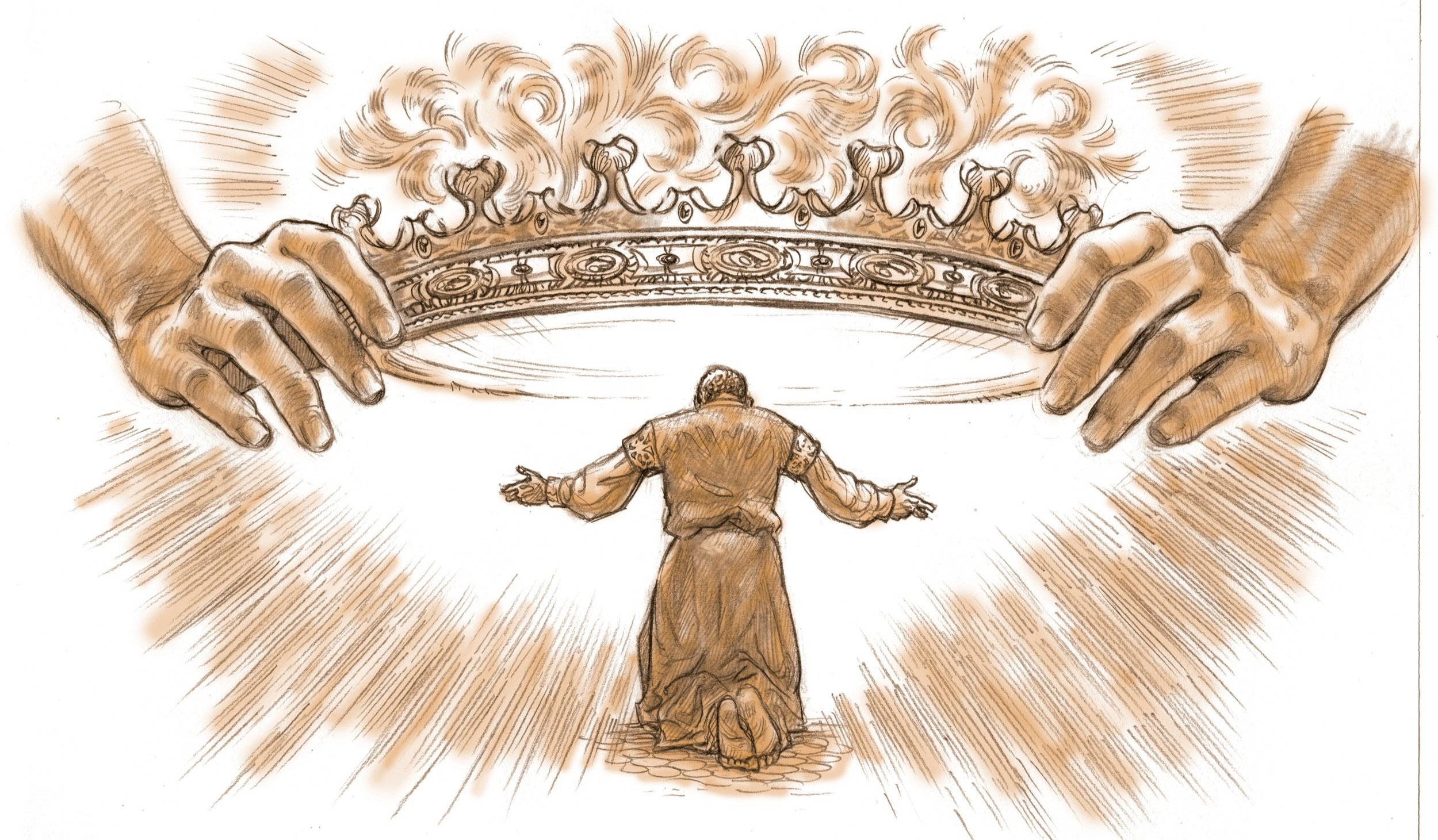A Parable Comparing Self-righteous Prayers to Humble Prayers
Context: Jesus told this parable in order to teach his followers a lesson about who their confidence should be in. In this parable the Pharisee put his confidence in himself and his own self-righteousness, while the Tax Collector was humble and believed he needed a Savior. The Tax Collector’s confidence was in God’s righteousness, not his own. Likewise, we should all put our confidence in God’s ability to save us and not in our own actions.
Then Jesus told this story to some who had great confidence in their own righteousness and scorned everyone else: “Two men went to the Temple to pray. One was a Pharisee, and the other was a despised tax collector. The Pharisee stood by himself and prayed this prayer: ‘I thank you, God, that I am not like other people—cheaters, sinners, adulterers. I’m certainly not like that tax collector! I fast twice a week, and I give you a tenth of my income.’
“But the tax collector stood at a distance and dared not even lift his eyes to heaven as he prayed. Instead, he beat his chest in sorrow, saying, ‘O God, be merciful to me, for I am a sinner.’ I tell you, this sinner, not the Pharisee, returned home justified before God. For those who exalt themselves will be humbled, and those who humble themselves will be exalted.”
-Luke 18:9-14 (NLT)
King Hezekiah’s Prayer with the Enemy at Their Gates
Context: Sennacherib, the King of Assyria has been conquering nation after nation and he has now brought his army to the gates of Jerusalem. He tells King Hezekiah that he should surrender and he uses every other nation he has defeated as an example, claiming that their gods could not save them from him so Hezekiah would be foolish to think his God could do any better. Instead of surrendering, Hezekiah takes his concerns to God with this prayer.
God responded through His prophet, Isaiah, letting Hezekiah know that He had heard Sennacherib’s blasphemies and that Hezekiah had nothing to worry about. God promised to make Sennacherib return home where he would be destroyed by the sword. God did exactly as He promised. Sennacherib got news which had him return to Nineveh, and, then, while he was worshiping his god, Nisrok, in his temple, his own sons killed him with their swords.
And Hezekiah prayed to the Lord: “Lord, the God of Israel, enthroned between the cherubim, you alone are God over all the kingdoms of the earth. You have made heaven and earth. Give ear, Lord, and hear; open your eyes, Lord, and see; listen to the words Sennacherib has sent to ridicule the living God.
“It is true, Lord, that the Assyrian kings have laid waste to these nations and their lands. They have thrown their gods into the fire and destroyed them, for they were not gods but only wood and stone, fashioned by human hands. Now, Lord our God, deliver us from his hand, so that all the kingdoms of the earth may know that you alone, Lord, are God.”
-2 Kings 19:15-19 (NIV)
Jonah’s Prayer for Deliverance
Context: Jonah was a prophet of God. When God told Jonah to go to Nineveh and preach repentance to them, Jonah refused. Nineveh had a history of being very cruel to other nations, including the Israelites, so Jonah didn’t want to help them out at all. He knew that God is a God of forgiveness and he didn’t want to give them a chance to repent because he didn’t want God to forgive them.
Jonah tried to run away by getting on a boat heading away from Nineveh. But, you can’t run away from God. God sent a bad storm. Jonah knew it was his fault, so he told the people on the ship that he needed to be thrown overboard if they wanted to survive the storm. When he was thrown overboard, God sent a big fish to swallow Jonah, but Jonah didn’t die, God kept him alive in the fish. While Jonah is in the fish he prays this prayer.
It’s interesting to note that this prayer is in the past tense. Jonah prayed as if God had already saved him. Jonah knew what God wanted and knew if he asked for help and forgiveness he would be granted it and saved. Sure enough, after this prayer God had the fish spit Jonah out onto dry land, and Jonah made his way to Nineveh.
“I called out to the Lord, out of my distress,
and he answered me;
out of the belly of Sheol I cried,
and you heard my voice.
For you cast me into the deep,
into the heart of the seas,
and the flood surrounded me;
all your waves and your billows
passed over me.
Then I said, ‘I am driven away
from your sight;
yet I shall again look
upon your holy temple.’
The waters closed in over me to take my life;
the deep surrounded me;
weeds were wrapped about my head
at the roots of the mountains.
I went down to the land
whose bars closed upon me forever;
yet you brought up my life from the pit,
O Lord my God.
When my life was fainting away,
I remembered the Lord,
and my prayer came to you,
into your holy temple.
Those who pay regard to vain idols
forsake their hope of steadfast love.
But I with the voice of thanksgiving
will sacrifice to you;
what I have vowed I will pay.
Salvation belongs to the Lord!”
-Jonah 2:1b-9 (ESV)
Solomon’s Prayer for Wisdom
Context: Solomon had recently become the new king of Israel, succeeding his father, King David. Instead of trusting in his own ability to lead, he turned to God for help. God offered him anything he wanted. This prayer is Solomon’s reply to God’s offer.
Instead of asking for riches or fame, Solomon asked for the wisdom required to be a good leader. God was pleased with the fact that Solomon’s heart was focused on taking care of his people instead of on selfish endeavors, so He granted Solomon’s request for wisdom but also promised him riches and fame.
To this day, even in secular settings, Solomon is known as the wisest man and king to ever live.
Solomon replied, “You showed great and faithful love to your servant, my father, David, because he was honest and true and faithful to you. And you have continued to show this great and faithful love to him today by giving him a son to sit on his throne.
“Now, O Lord my God, you have made me king instead of my father, David, but I am like a little child who doesn’t know his way around. And here I am in the midst of your own chosen people, a nation so great and numerous they cannot be counted! Give me an understanding heart so that I can govern your people well and know the difference between right and wrong. For who by himself is able to govern this great people of yours?”
-1 Kings 3:6-9 (NLT)
The Prayer of Jabez
Context: This is a short prayer that is stuck right in the middle of a genealogical record written by Ezra about the Israelites who returned home after their Babylonian exile. Jabez’s prayer shows that he understood God’s promises to the nation of Israel. Jabez asked God to grant him exactly what God had already promised to do for the Israelite people if they would simply come to Him in prayer (Jeremiah 29:10-14). Jabez did precisely what God wanted all of the people listed in this genealogical record to do; he chose to follow God and God kept His promises.
We are not living during the same time Jabez was--we are not Israelites being brought back to our homeland from our exile in Babylon--so we also don’t live under the same prophetic messages and promises which Jabez lived under. However, there are still truths which we can learn from this: God always keeps His promises; and it is wise to learn which promises are meant for us and then to pray in line with them.
Jabez was more honorable than his brothers; and his mother called his name Jabez, saying, “Because I bore him in pain.” Jabez called upon the God of Israel, saying, “Oh that you would bless me and enlarge my border, and that your hand might be with me, and that you would keep me from harm so that it might not bring me pain!” And God granted what he asked.
-1 Chronicles 4:9-10 (ESV)
Paul’s Prayer for the Believers in Ephesus
Context: The book of Ephesians is a letter Paul wrote to the faithful followers of Christ in the church of Ephesus. He started out praising God for the grace He has given through Christ’s sacrifice on the cross for the forgiveness of sins. Paul also said they should praise God for giving believers the Holy Spirit as a guarantee of salvation and spiritual inheritance. Then he prayed for the believers to grow in their wisdom and knowledge of God and to understand God’s power and everything He does and has done for the people who have believed in Him.
We may not be Ephesians; however, if you have accepted Jesus as your Savior and trusted in His sacrifice on the cross to pay for your sins, then the truths found in this prayer can also be applied to you. It is a prayer for believers (those who “belong to His dear Son”) during the church age, and we are also believers during the church age.
So we praise God for the glorious grace he has poured out on us who belong to his dear Son. He is so rich in kindness and grace that he purchased our freedom with the blood of his Son and forgave our sins. He has showered his kindness on us, along with all wisdom and understanding.
…
And now you Gentiles have also heard the truth, the Good News that God saves you. And when you believed in Christ, he identified you as his own by giving you the Holy Spirit, whom he promised long ago. The Spirit is God’s guarantee that he will give us the inheritance he promised and that he has purchased us to be his own people. He did this so we would praise and glorify him.
Ever since I first heard of your strong faith in the Lord Jesus and your love for God’s people everywhere, I have not stopped thanking God for you. I pray for you constantly, asking God, the glorious Father of our Lord Jesus Christ, to give you spiritual wisdom and insight so that you might grow in your knowledge of God. I pray that your hearts will be flooded with light so that you can understand the confident hope he has given to those he called—his holy people who are his rich and glorious inheritance.
I also pray that you will understand the incredible greatness of God’s power for us who believe him. This is the same mighty power that raised Christ from the dead and seated him in the place of honor at God’s right hand in the heavenly realms. Now he is far above any ruler or authority or power or leader or anything else—not only in this world but also in the world to come. God has put all things under the authority of Christ and has made him head over all things for the benefit of the church. And the church is his body; it is made full and complete by Christ, who fills all things everywhere with himself.
- Ephesians 1:6-8; 13-23 (NLT)
This series of blog posts titled, “Holding on to Reason”, is named after Amanda’s favorite C.S. Lewis quote: “Faith is the art of holding on to things your reason has once accepted, in spite of your changing moods.”













